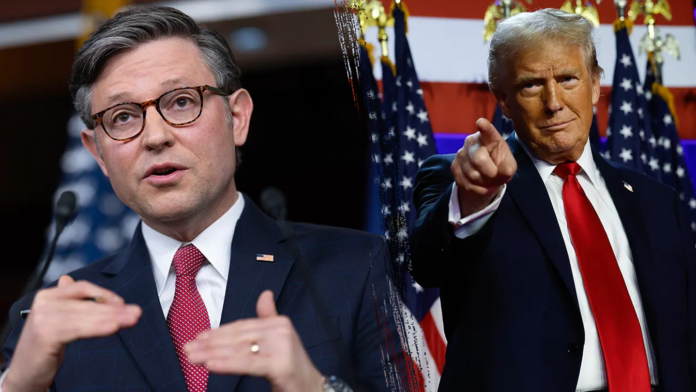Speaker Mike Johnson, R-La., informed Republican legislators on Saturday that President-elect Trump wants to change conservative policies in a single huge measure, according to three sources.
According to insiders, Trump wants such a law on his desk by May from both the House and the Senate. The president-elect’s support will likely put an end to the developing intraparty debate over how to achieve Republican goals next year through a process known as “reconciliation,” which lawmakers intend to use to implement conservative policy and budget changes.
On Saturday, House Republicans convened behind closed doors at Washington’s Fort McNair to debate the plan.
Reconciliation allows the Senate to circumvent its conventional 60-vote threshold in favor of a simple majority, as long as the measure addresses financial and other fiscal issues.
Both parties have usually used reconciliation to pass major policy changes in a single measure. However, the law is subjected to a rigorous evaluation, with the Senate parliamentarian determining what is and is not relevant to US budgetary problems.
Notably, Democrats previously attempted to utilize reconciliation to pass mass amnesty legislation, but were defeated.
Republicans may face similar challenges in their efforts to add border security features to the plan. They also intend to use it to prolong President Trump’s 2017 Tax Cuts and Jobs Act (TCJA), as well as to approve energy and defense legislation.
Johnson’s apparent decision on Saturday comes after congressional Republicans were divided over whether to support one or two reconciliation bills.
It is a method that is typically employed once a year, but Senate Majority Leader John Thune, R-S.D., proposed a plan last month to divide Republicans’ goals into two bills, one dealing with the border and defense and the other targeted at protecting Trump’s tax policy.
Stephen Miller, a prominent Trump aide, also approved the concept.
However, Republicans on the House Ways and Means Committee were outraged, warning that two reconciliation bills would be too much of a burden, and that putting taxes second would jeopardize remaining GOP tax provisions, which are slated to expire at the end of the year.
House Ways and Means Committee Chairman Jason Smith, R-Mo., noted on Fox Business Network’s “Mornings With Maria” that Congress had not passed two reconciliation bills in a single year since 1997.
“I believe we need a reconciliation measure that includes border, energy, permitting, and tax. “If you put all four of those things together, we can deliver,” Smith stated.
Rep. Nicole Malliotakis, R-N.Y., a member of the Ways and Means Committee, described the meeting as “an informative and productive day where we exchanged ideas, priorities, and procedures to accomplish our legislative goals of securing our borders, deporting cartels and criminals, saving trafficked children, restoring energy dominance, reducing bureaucracy and wasteful spending, and building upon President Trump’s historic tax cuts.”
“We are united and ready to deliver for Americans in what will be a momentous year for Congress and the country,” Malliotakis told HeadlinesForever Digital.
Last month, the panel issued a memo warning that if Trump’s tax cuts expire, average Americans’ taxes may climb by 22%.
However, other lawmakers scoffed at the notion that two bills were impossible.
House Freedom Caucus Chairman Andy Harris, R-Md., told HeadlinesForever Digital this month, “I believe we must demonstrate to the American people that we can genuinely defend our borders. The basic line is that I believe they should be on practically parallel lines. But I believe taxes are far more complicated.”
HeadlinesForever Digital contacted Thune and Smith’s offices for comment. Thune’s office answered but declined to comment, while Smith’s office did not immediately react.
